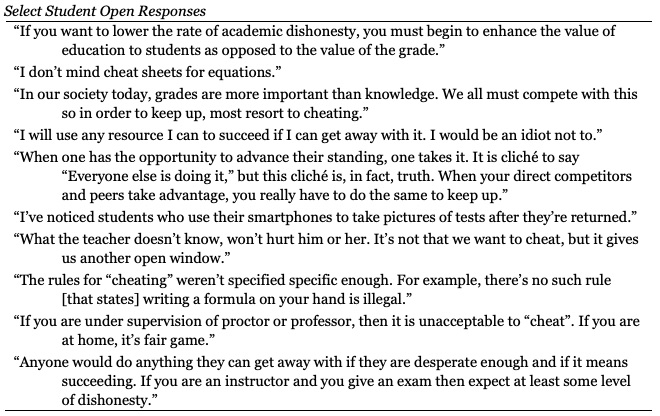New research provides empirical evidence bolstering the value and need for test proctoring in higher education. The study, published last month in the Journal of the National College Testing Association, primarily sought to identify student perspectives and attitudes toward different forms of academic misconduct on tests in proctored and unproctored environments. The authors obtained both qualitative and quantitative data that suggested students are more likely to engage in academic misconduct or cheat on unproctored tests. Results also show that students view cheating behavior as more acceptable in an unproctored environment.
While both of these findings validate the need for proctoring, the authors’ review of the qualitative (open-ended) responses were of particular interest. A common theme revolved around student insistence “that the responsibility for mitigating the opportunity for cheating be placed on the institution and the instructor,” and that, “unless cheating is being prevented and discussed, the institution is essentially tacitly encouraging it.”1 Based on these comments, the authors inferred that, “any inaction on the part of the faculty to provide a secure exam administration was seen as an indication that the faculty did not care about test security or cheating.” See the image at the end of this post for some selected student quotes.
KEY FINDING:
“The results of this study indicate that students are more likely to engage in cheating behaviour in an unproctored environment, as hypothesized.”
While the authors did not specifically look at online proctored environments, they were very direct in their advice to institutions and instructors expanding into online education: “…when building curricula for online coursework, proctoring must be incorporated and available for all tests and assessments.” The authors go on to boldly urge, “Faculty and staff should not make the egregious mistake of believing an honor code, signed statement of integrity, verbal acceptance of syllabi expectations, or other tacitly communicated acceptance is alone enough to sway academic dishonesty in online courses.”
Many naysayers of proctoring, especially online proctoring, take the stance that the act of monitoring students during an exam indicates a level of inherent distrust in all students. On the contrary, we have found that the percentage of students who will attempt to cheat on any given exam is relatively low. However, this study reiterates and affirms that if an exam is not proctored, students are not only more likely to cheat, but that they also view cheating as more acceptable, with some even perceiving the lack of proctoring as an open invitation to cheat. It stands to reason that if educators care about the academic integrity of their exams and their programs, they will take action to secure the testing environment.
Given the current state of flux in higher education and the continued migration to online coursework as the world navigates the COVID-19 pandemic, all educators would be wise to consider the findings of this study as they make decisions about online and remote proctoring. While live remote proctoring is the “gold standard,” we understand that not all exams warrant that level of protection and investment. It is important to consider all available proctoring options and choose the one that meets the goals of your exam administration.
Below is a table of responses pulled directly from the article:

1Dryer, J. M., Pettyjohn, H. C., & Saladin, S. (2020). Academic Dishonesty and Testing: How Student Beliefs and Test Settings Impact Decisions to Cheat. Journal of the National College Testing Association, 4(1). Retrieved from https://www.ncta-testing.org/journal-of-ncta